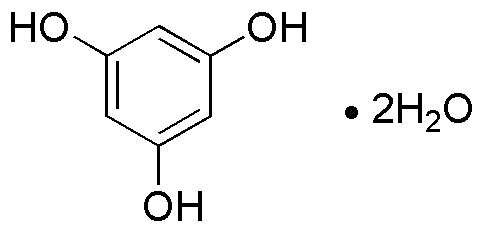Phloroglucinol dihydrate is widely utilized in research focused on:
- Pharmaceutical Development: This compound is often used in the formulation of medications for gastrointestinal disorders due to its antispasmodic properties, helping to relieve cramps and discomfort.
- Analytical Chemistry: It serves as a reagent in various analytical techniques, including colorimetric assays, where it helps in the detection of certain compounds, enhancing the accuracy of results.
- Plant Physiology Studies: Researchers use phloroglucinol dihydrate to investigate plant cell structures, particularly in the study of lignin and cellulose, aiding in understanding plant growth and development.
- Cosmetic Industry: Its antioxidant properties make it a valuable ingredient in skincare products, helping to protect the skin from oxidative stress and improve overall skin health.
- Food Industry: It is utilized as a flavoring agent and preservative, contributing to the stability and taste of various food products, ensuring quality and safety for consumers.
Informations générales
Propriétés
Sécurité et réglementation
Applications
Phloroglucinol dihydrate is widely utilized in research focused on:
- Pharmaceutical Development: This compound is often used in the formulation of medications for gastrointestinal disorders due to its antispasmodic properties, helping to relieve cramps and discomfort.
- Analytical Chemistry: It serves as a reagent in various analytical techniques, including colorimetric assays, where it helps in the detection of certain compounds, enhancing the accuracy of results.
- Plant Physiology Studies: Researchers use phloroglucinol dihydrate to investigate plant cell structures, particularly in the study of lignin and cellulose, aiding in understanding plant growth and development.
- Cosmetic Industry: Its antioxidant properties make it a valuable ingredient in skincare products, helping to protect the skin from oxidative stress and improve overall skin health.
- Food Industry: It is utilized as a flavoring agent and preservative, contributing to the stability and taste of various food products, ensuring quality and safety for consumers.
Documents
Fiches de données de sécurité (FDS)
La FDS fournit des informations de sécurité complètes sur la manipulation, le stockage et l’élimination du produit.
Spécifications du produit (PS)
Le PS fournit une description complète des propriétés du produit, notamment sa composition chimique, son état physique, sa pureté et les exigences de stockage. Il détaille également les plages de qualité acceptables et les applications prévues du produit.
Certificats d'analyse (COA)
Recherchez des certificats d'analyse (COA) en saisissant le numéro de lot du produit. Les numéros de lot et de lot se trouvent sur l'étiquette d'un produit, après les mots « Lot » ou « Lot de fabrication ».
Numéro de catalogue
Numéro de lot/série
Certificats d'origine (COO)
Ce certificat d'exploitation confirme le pays dans lequel le produit a été fabriqué, et détaille également les matériaux et composants utilisés et s'il est issu de sources naturelles, synthétiques ou autres sources spécifiques. Ce certificat peut être requis pour les douanes, le commerce et la conformité réglementaire.
Numéro de catalogue
Numéro de lot/série
Fiches de données de sécurité (FDS)
La FDS fournit des informations de sécurité complètes sur la manipulation, le stockage et l’élimination du produit.
DownloadSpécifications du produit (PS)
Le PS fournit une description complète des propriétés du produit, notamment sa composition chimique, son état physique, sa pureté et les exigences de stockage. Il détaille également les plages de qualité acceptables et les applications prévues du produit.
DownloadCertificats d'analyse (COA)
Recherchez des certificats d'analyse (COA) en saisissant le numéro de lot du produit. Les numéros de lot et de lot se trouvent sur l'étiquette d'un produit, après les mots « Lot » ou « Lot de fabrication ».
Numéro de catalogue
Numéro de lot/série
Certificats d'origine (COO)
Ce certificat d'exploitation confirme le pays dans lequel le produit a été fabriqué, et détaille également les matériaux et composants utilisés et s'il est issu de sources naturelles, synthétiques ou autres sources spécifiques. Ce certificat peut être requis pour les douanes, le commerce et la conformité réglementaire.


